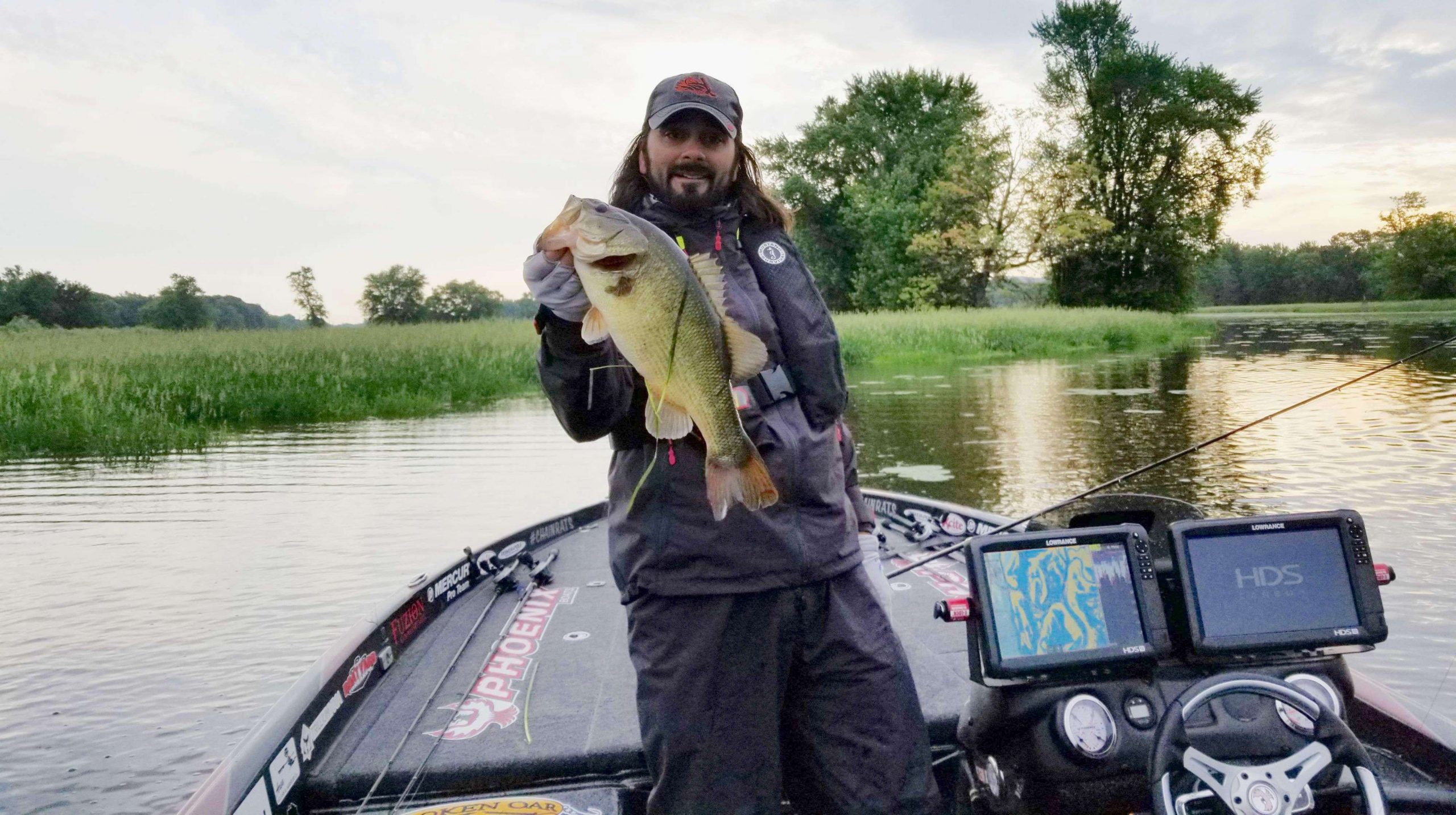
Bassmaster Elite Series sophomore Chris Groh’s long hair may represent a fashion decision or a lifestyle choice, but more likely it reflects the fact that he can’t stop moving long enough to get a haircut. The Illinois angler was raised in a house “with water on all sides but one,” and he developed an omnivorous taste for all things finned. Despite developing a desire to go pro at 8 years old, that dream didn’t take root until last year, when he turned 40.
He may be a late bloomer on the national scene, but the self-described “Chain Rat” developed his chops over years of training, with a wide variety of influences. The first was his father, who wasn’t specifically a bass angler, but took young Chris to Canada for annual trips.
“I was jacked up for every single hammer handle pike there is,” he recalled. “I’d throw a Rat-L-Trap or a Mepps spinner and the tug was my drug. Then I discovered there were smallmouth up there. They’d put me through the ringer to catch a limit of walleye first, but after that I’d play Bassmaster Classic in the Promised Land.”
By the time he was 13, he started working at Triangle Sports, a local tackle store. “Don’t tell anyone,” he stated. “Child labor laws.” That led to his immersion in the local tournament scene. The owner had fished the Bassmaster Invitationals, and another customer was a car racer who paid Groh’s entry fees in exchange for waxing his new boat. He didn’t yet have a tournament-ready boat of his own in the early years, but “every once in a while someone needed a sub on the Chain. I did OK here and there. I was feeding that feeling.”
Each new Triangle employee got a nickname, and “all of the nicknames have stuck.” For reasons that remain unclear, he was dubbed “Weasel,” and promises that if he wins “one hundred grand, you’re gonna see the Weasel on stage.” When he got his first legit bass boat, he started Weasel’s Guide Service, working a full-time schedule at the shop, then guiding an additional three or four days a week.
“That place is what made it all come together,” he said of those early years.
He went away to school for a few years, but was unable to take a boat with him, and couldn’t fish nearly as much. He’d cram 25 tournaments into the summer months, but it didn’t satisfy his tournament itch, so he headed home full-time and started to fish every circuit he could – everything from BFLs to major team trails like Anglers Choice.
He won the Minnetonka Classic and won a boat on the Mississippi River, but at the same time he built up a successful business setting tile and working in construction. That financed the dream but also anchored him, preventing him from chasing the fishing dream full-time. While his parents were supportive, they also believed that a career as a pro angler was limited, or unlikely, and “once in a while they’d say something like ‘You might want to work this Saturday.’”
Today Groh admits that added doubt to his long-term goals. “I’m not saying that my dad held me back, but he was a realist.”
When his father died three years ago he went into a funk, but ultimately it pushed him over the edge to take a risk. “When he passed, I literally quit,” he recalled, but then his mother advised him to get back on the water. “That’s the only way you can cope,” she said. Three weeks later he was on the road to Florida for a Southern Open. A dream deferred was being fulfilled. While he waited a long time to get to that point, he doesn’t necessarily regret the delay, and he recognizes that his work in the trades allowed him to develop the work ethic to “understand what I have to do to succeed.”
Groh is not married, has no kids, and describes himself as “sort of a gypsy,” but he’ll remain tied to his northern Illinois roots, partially because of his loyalty to the Chain Rats, partially because he helps take care of his mother’s property. Despite the heavy metal look, he’s a doting uncle to his nieces and puts family first. He still fishes local events when he can, but he admits with a laugh that, “Now I’m the glorified sub, the pass-the-buck guy.”
His father remains his guiding light, the influencer who pushed him to go for it, and whose life convinced him that he “didn’t want to be 60 years old, crippled from tile work, saying what could have been.” Now he’s fully invested in the bass life. “Last year I was grouting a job the night before I left for Martin,” he recalled, comparing that to his new “all-in” attitude.
The bass life was there all along, and now it’s just on a bigger stage. It’s all fishing and family all the time, except for brief periods when he’s looking to down a big buck.
“I’ll probably die in a tree stand,” he said. “But before then my No. 1 goal is to capture a blue trophy. It’s a sickness. Being a 40-year-old rookie, now 41 years old in my second year, I’ve got 20 years left in my mind. I want to keep my average good and make some money.”

